An Analysis of Job Insecurity's Impact on UK Employee Satisfaction
VerifiedAdded on 2020/10/05
|8
|1689
|115
Report
AI Summary
This report delves into the impact of job insecurity on employee satisfaction in the UK, drawing on a literature review of key articles. It explores the direct relationship between job insecurity and employee satisfaction, highlighting how changes in the workplace, such as technological advancements and increased competition, contribute to employee anxieties. The report examines the consequences of job insecurity, including psychological impacts like stress and diminished career development opportunities. It emphasizes the importance of addressing job insecurity to foster employee well-being and improve work performance, concluding that companies should focus on providing opportunities for skill enhancement and personal growth to mitigate these negative effects and retain talent. The research synthesizes findings from various researchers and psychologists, offering a comprehensive analysis of the topic.

The impact on job insecurity on
employees satisfaction in the UK
employees satisfaction in the UK
Paraphrase This Document
Need a fresh take? Get an instant paraphrase of this document with our AI Paraphraser
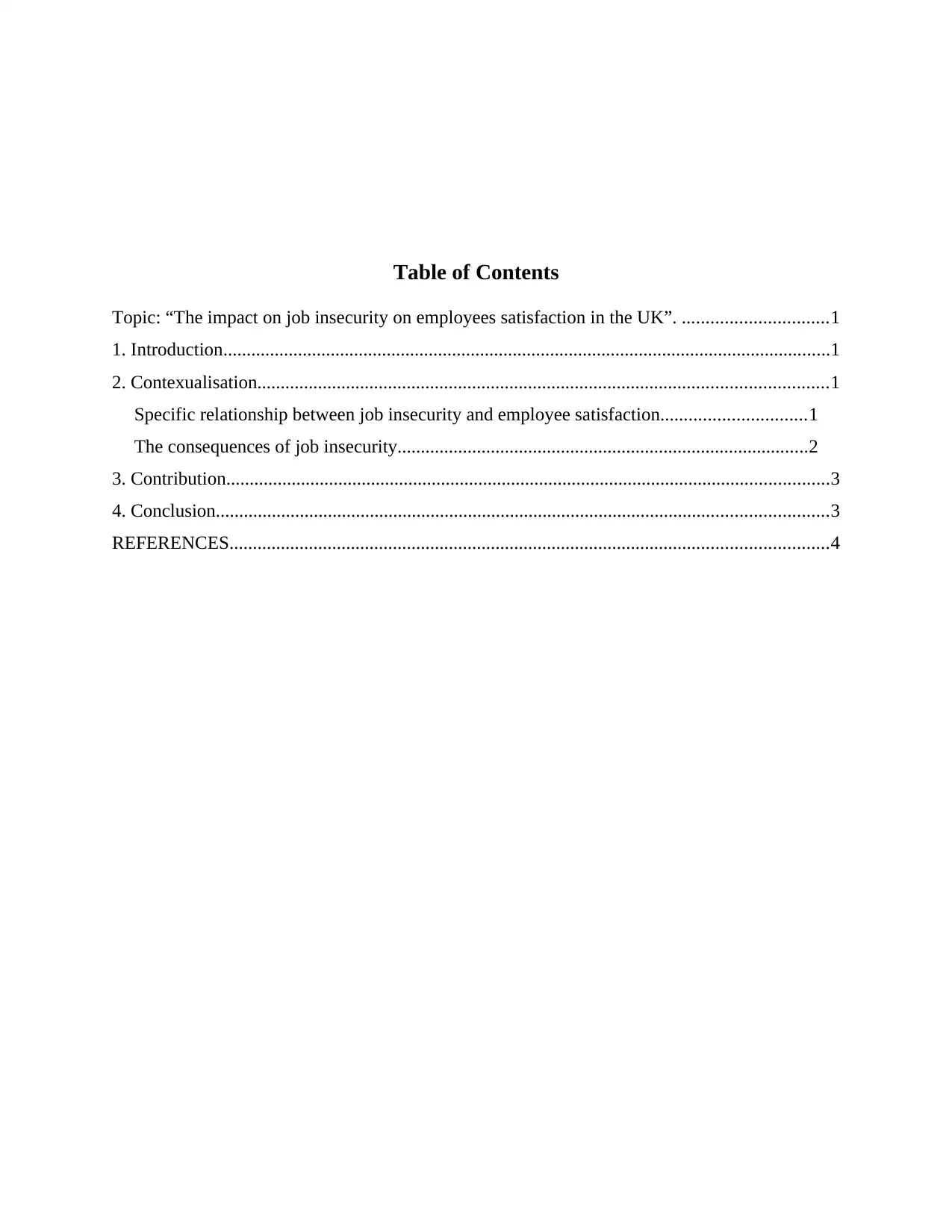
Table of Contents
Topic: “The impact on job insecurity on employees satisfaction in the UK”. ...............................1
1. Introduction..................................................................................................................................1
2. Contexualisation..........................................................................................................................1
Specific relationship between job insecurity and employee satisfaction...............................1
The consequences of job insecurity........................................................................................2
3. Contribution.................................................................................................................................3
4. Conclusion...................................................................................................................................3
REFERENCES................................................................................................................................4
Topic: “The impact on job insecurity on employees satisfaction in the UK”. ...............................1
1. Introduction..................................................................................................................................1
2. Contexualisation..........................................................................................................................1
Specific relationship between job insecurity and employee satisfaction...............................1
The consequences of job insecurity........................................................................................2
3. Contribution.................................................................................................................................3
4. Conclusion...................................................................................................................................3
REFERENCES................................................................................................................................4

⊘ This is a preview!⊘
Do you want full access?
Subscribe today to unlock all pages.

Trusted by 1+ million students worldwide
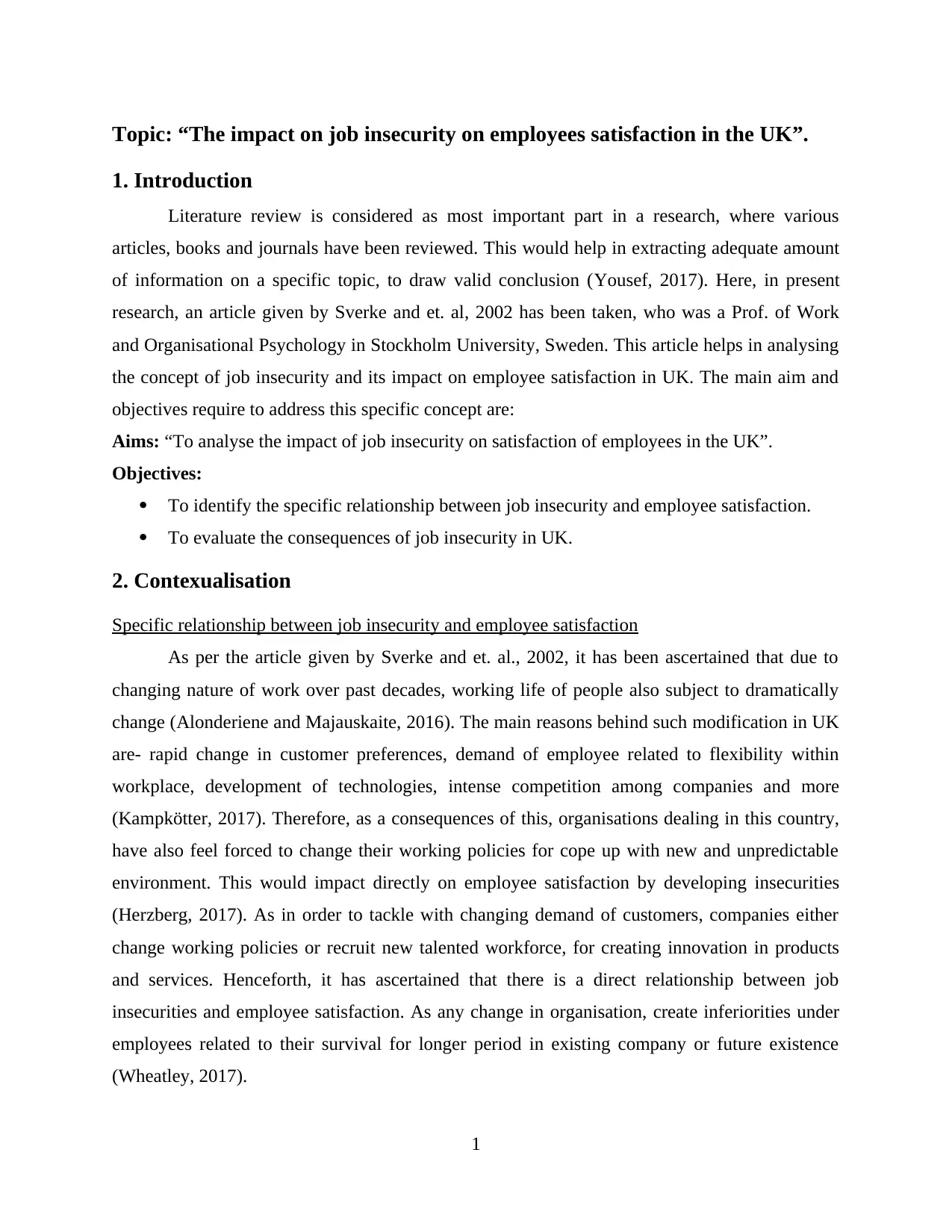
Topic: “The impact on job insecurity on employees satisfaction in the UK”.
1. Introduction
Literature review is considered as most important part in a research, where various
articles, books and journals have been reviewed. This would help in extracting adequate amount
of information on a specific topic, to draw valid conclusion (Yousef, 2017). Here, in present
research, an article given by Sverke and et. al, 2002 has been taken, who was a Prof. of Work
and Organisational Psychology in Stockholm University, Sweden. This article helps in analysing
the concept of job insecurity and its impact on employee satisfaction in UK. The main aim and
objectives require to address this specific concept are:
Aims: “To analyse the impact of job insecurity on satisfaction of employees in the UK”.
Objectives:
To identify the specific relationship between job insecurity and employee satisfaction.
To evaluate the consequences of job insecurity in UK.
2. Contexualisation
Specific relationship between job insecurity and employee satisfaction
As per the article given by Sverke and et. al., 2002, it has been ascertained that due to
changing nature of work over past decades, working life of people also subject to dramatically
change (Alonderiene and Majauskaite, 2016). The main reasons behind such modification in UK
are- rapid change in customer preferences, demand of employee related to flexibility within
workplace, development of technologies, intense competition among companies and more
(Kampkötter, 2017). Therefore, as a consequences of this, organisations dealing in this country,
have also feel forced to change their working policies for cope up with new and unpredictable
environment. This would impact directly on employee satisfaction by developing insecurities
(Herzberg, 2017). As in order to tackle with changing demand of customers, companies either
change working policies or recruit new talented workforce, for creating innovation in products
and services. Henceforth, it has ascertained that there is a direct relationship between job
insecurities and employee satisfaction. As any change in organisation, create inferiorities under
employees related to their survival for longer period in existing company or future existence
(Wheatley, 2017).
1
1. Introduction
Literature review is considered as most important part in a research, where various
articles, books and journals have been reviewed. This would help in extracting adequate amount
of information on a specific topic, to draw valid conclusion (Yousef, 2017). Here, in present
research, an article given by Sverke and et. al, 2002 has been taken, who was a Prof. of Work
and Organisational Psychology in Stockholm University, Sweden. This article helps in analysing
the concept of job insecurity and its impact on employee satisfaction in UK. The main aim and
objectives require to address this specific concept are:
Aims: “To analyse the impact of job insecurity on satisfaction of employees in the UK”.
Objectives:
To identify the specific relationship between job insecurity and employee satisfaction.
To evaluate the consequences of job insecurity in UK.
2. Contexualisation
Specific relationship between job insecurity and employee satisfaction
As per the article given by Sverke and et. al., 2002, it has been ascertained that due to
changing nature of work over past decades, working life of people also subject to dramatically
change (Alonderiene and Majauskaite, 2016). The main reasons behind such modification in UK
are- rapid change in customer preferences, demand of employee related to flexibility within
workplace, development of technologies, intense competition among companies and more
(Kampkötter, 2017). Therefore, as a consequences of this, organisations dealing in this country,
have also feel forced to change their working policies for cope up with new and unpredictable
environment. This would impact directly on employee satisfaction by developing insecurities
(Herzberg, 2017). As in order to tackle with changing demand of customers, companies either
change working policies or recruit new talented workforce, for creating innovation in products
and services. Henceforth, it has ascertained that there is a direct relationship between job
insecurities and employee satisfaction. As any change in organisation, create inferiorities under
employees related to their survival for longer period in existing company or future existence
(Wheatley, 2017).
1
Paraphrase This Document
Need a fresh take? Get an instant paraphrase of this document with our AI Paraphraser
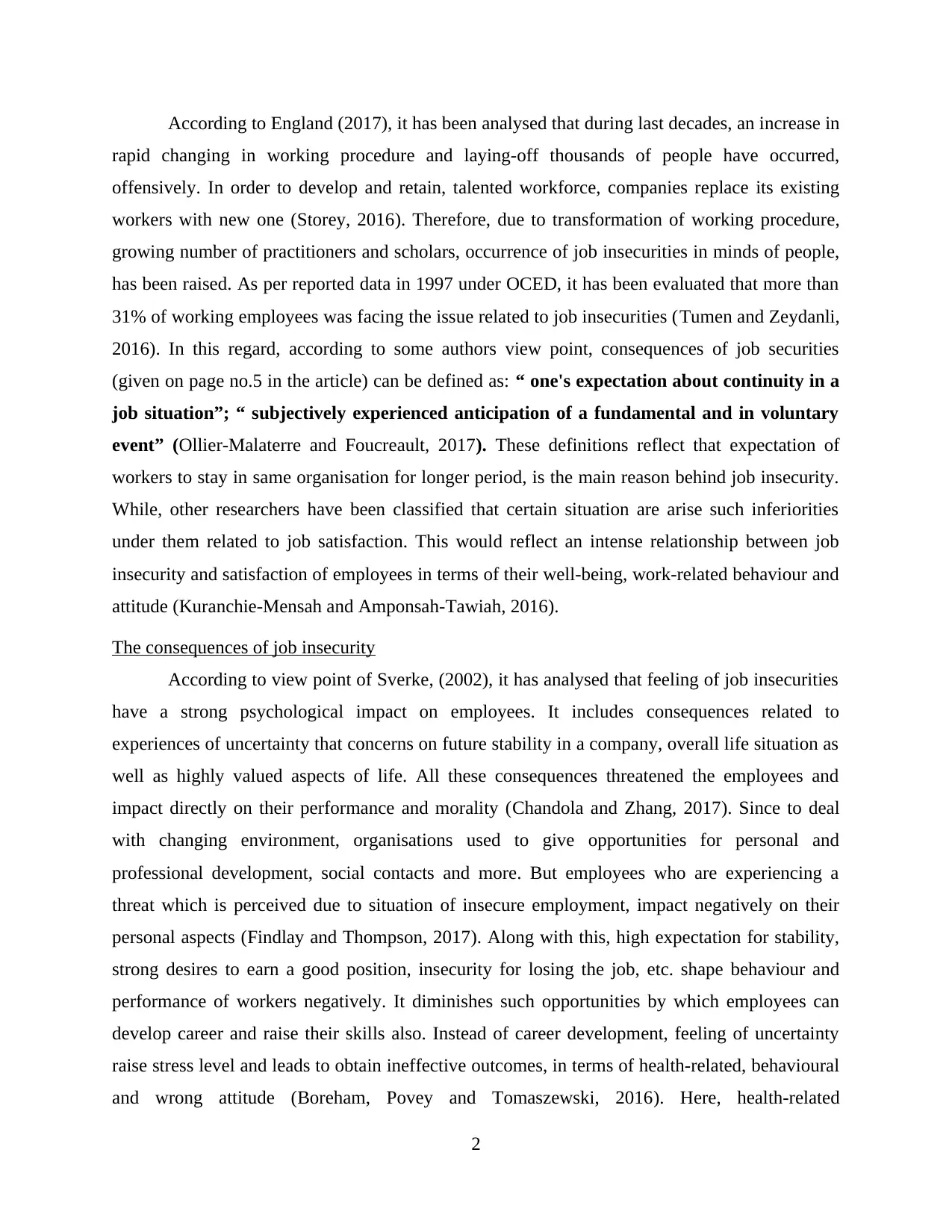
According to England (2017), it has been analysed that during last decades, an increase in
rapid changing in working procedure and laying-off thousands of people have occurred,
offensively. In order to develop and retain, talented workforce, companies replace its existing
workers with new one (Storey, 2016). Therefore, due to transformation of working procedure,
growing number of practitioners and scholars, occurrence of job insecurities in minds of people,
has been raised. As per reported data in 1997 under OCED, it has been evaluated that more than
31% of working employees was facing the issue related to job insecurities (Tumen and Zeydanli,
2016). In this regard, according to some authors view point, consequences of job securities
(given on page no.5 in the article) can be defined as: “ one's expectation about continuity in a
job situation”; “ subjectively experienced anticipation of a fundamental and in voluntary
event” (Ollier-Malaterre and Foucreault, 2017). These definitions reflect that expectation of
workers to stay in same organisation for longer period, is the main reason behind job insecurity.
While, other researchers have been classified that certain situation are arise such inferiorities
under them related to job satisfaction. This would reflect an intense relationship between job
insecurity and satisfaction of employees in terms of their well-being, work-related behaviour and
attitude (Kuranchie-Mensah and Amponsah-Tawiah, 2016).
The consequences of job insecurity
According to view point of Sverke, (2002), it has analysed that feeling of job insecurities
have a strong psychological impact on employees. It includes consequences related to
experiences of uncertainty that concerns on future stability in a company, overall life situation as
well as highly valued aspects of life. All these consequences threatened the employees and
impact directly on their performance and morality (Chandola and Zhang, 2017). Since to deal
with changing environment, organisations used to give opportunities for personal and
professional development, social contacts and more. But employees who are experiencing a
threat which is perceived due to situation of insecure employment, impact negatively on their
personal aspects (Findlay and Thompson, 2017). Along with this, high expectation for stability,
strong desires to earn a good position, insecurity for losing the job, etc. shape behaviour and
performance of workers negatively. It diminishes such opportunities by which employees can
develop career and raise their skills also. Instead of career development, feeling of uncertainty
raise stress level and leads to obtain ineffective outcomes, in terms of health-related, behavioural
and wrong attitude (Boreham, Povey and Tomaszewski, 2016). Here, health-related
2
rapid changing in working procedure and laying-off thousands of people have occurred,
offensively. In order to develop and retain, talented workforce, companies replace its existing
workers with new one (Storey, 2016). Therefore, due to transformation of working procedure,
growing number of practitioners and scholars, occurrence of job insecurities in minds of people,
has been raised. As per reported data in 1997 under OCED, it has been evaluated that more than
31% of working employees was facing the issue related to job insecurities (Tumen and Zeydanli,
2016). In this regard, according to some authors view point, consequences of job securities
(given on page no.5 in the article) can be defined as: “ one's expectation about continuity in a
job situation”; “ subjectively experienced anticipation of a fundamental and in voluntary
event” (Ollier-Malaterre and Foucreault, 2017). These definitions reflect that expectation of
workers to stay in same organisation for longer period, is the main reason behind job insecurity.
While, other researchers have been classified that certain situation are arise such inferiorities
under them related to job satisfaction. This would reflect an intense relationship between job
insecurity and satisfaction of employees in terms of their well-being, work-related behaviour and
attitude (Kuranchie-Mensah and Amponsah-Tawiah, 2016).
The consequences of job insecurity
According to view point of Sverke, (2002), it has analysed that feeling of job insecurities
have a strong psychological impact on employees. It includes consequences related to
experiences of uncertainty that concerns on future stability in a company, overall life situation as
well as highly valued aspects of life. All these consequences threatened the employees and
impact directly on their performance and morality (Chandola and Zhang, 2017). Since to deal
with changing environment, organisations used to give opportunities for personal and
professional development, social contacts and more. But employees who are experiencing a
threat which is perceived due to situation of insecure employment, impact negatively on their
personal aspects (Findlay and Thompson, 2017). Along with this, high expectation for stability,
strong desires to earn a good position, insecurity for losing the job, etc. shape behaviour and
performance of workers negatively. It diminishes such opportunities by which employees can
develop career and raise their skills also. Instead of career development, feeling of uncertainty
raise stress level and leads to obtain ineffective outcomes, in terms of health-related, behavioural
and wrong attitude (Boreham, Povey and Tomaszewski, 2016). Here, health-related
2
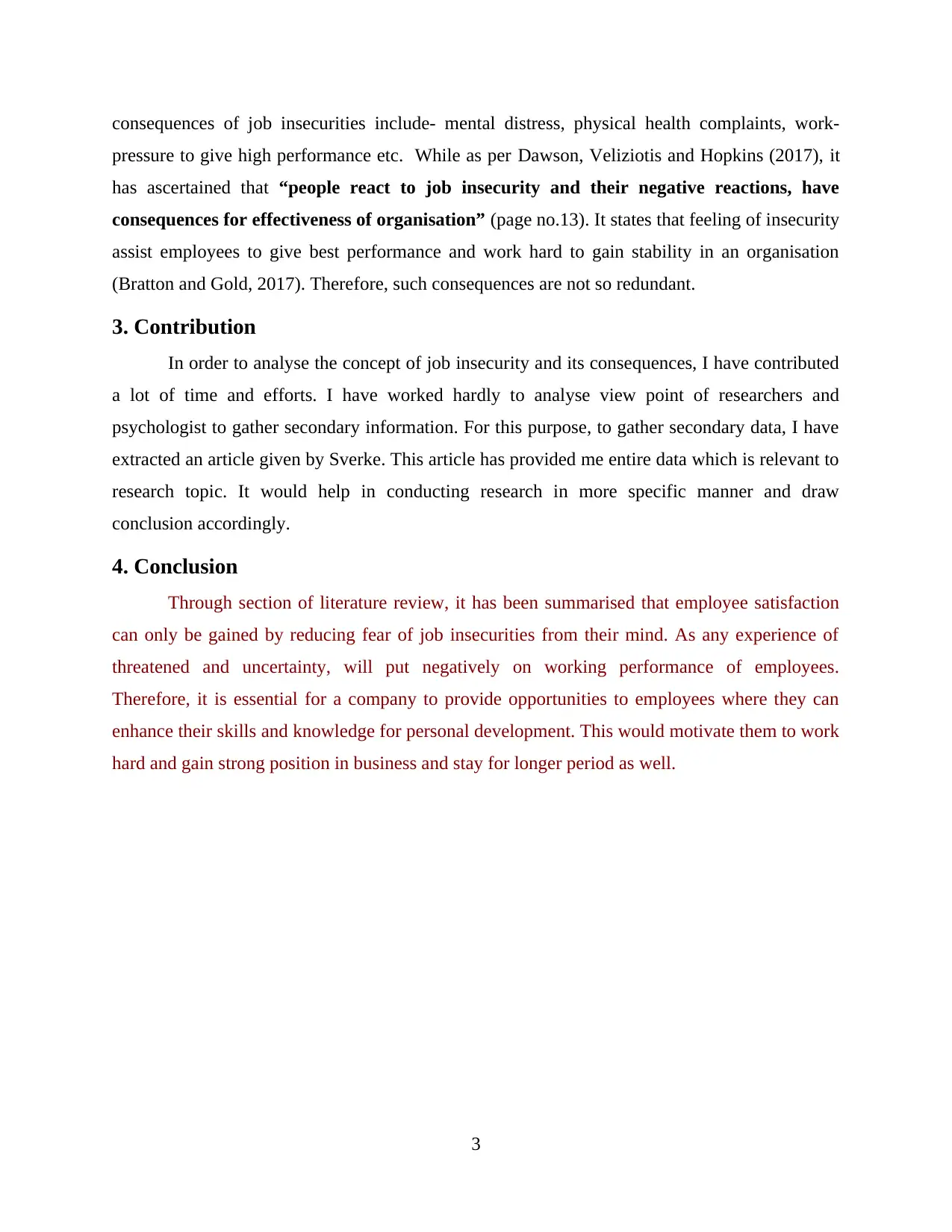
consequences of job insecurities include- mental distress, physical health complaints, work-
pressure to give high performance etc. While as per Dawson, Veliziotis and Hopkins (2017), it
has ascertained that “people react to job insecurity and their negative reactions, have
consequences for effectiveness of organisation” (page no.13). It states that feeling of insecurity
assist employees to give best performance and work hard to gain stability in an organisation
(Bratton and Gold, 2017). Therefore, such consequences are not so redundant.
3. Contribution
In order to analyse the concept of job insecurity and its consequences, I have contributed
a lot of time and efforts. I have worked hardly to analyse view point of researchers and
psychologist to gather secondary information. For this purpose, to gather secondary data, I have
extracted an article given by Sverke. This article has provided me entire data which is relevant to
research topic. It would help in conducting research in more specific manner and draw
conclusion accordingly.
4. Conclusion
Through section of literature review, it has been summarised that employee satisfaction
can only be gained by reducing fear of job insecurities from their mind. As any experience of
threatened and uncertainty, will put negatively on working performance of employees.
Therefore, it is essential for a company to provide opportunities to employees where they can
enhance their skills and knowledge for personal development. This would motivate them to work
hard and gain strong position in business and stay for longer period as well.
3
pressure to give high performance etc. While as per Dawson, Veliziotis and Hopkins (2017), it
has ascertained that “people react to job insecurity and their negative reactions, have
consequences for effectiveness of organisation” (page no.13). It states that feeling of insecurity
assist employees to give best performance and work hard to gain stability in an organisation
(Bratton and Gold, 2017). Therefore, such consequences are not so redundant.
3. Contribution
In order to analyse the concept of job insecurity and its consequences, I have contributed
a lot of time and efforts. I have worked hardly to analyse view point of researchers and
psychologist to gather secondary information. For this purpose, to gather secondary data, I have
extracted an article given by Sverke. This article has provided me entire data which is relevant to
research topic. It would help in conducting research in more specific manner and draw
conclusion accordingly.
4. Conclusion
Through section of literature review, it has been summarised that employee satisfaction
can only be gained by reducing fear of job insecurities from their mind. As any experience of
threatened and uncertainty, will put negatively on working performance of employees.
Therefore, it is essential for a company to provide opportunities to employees where they can
enhance their skills and knowledge for personal development. This would motivate them to work
hard and gain strong position in business and stay for longer period as well.
3
⊘ This is a preview!⊘
Do you want full access?
Subscribe today to unlock all pages.

Trusted by 1+ million students worldwide
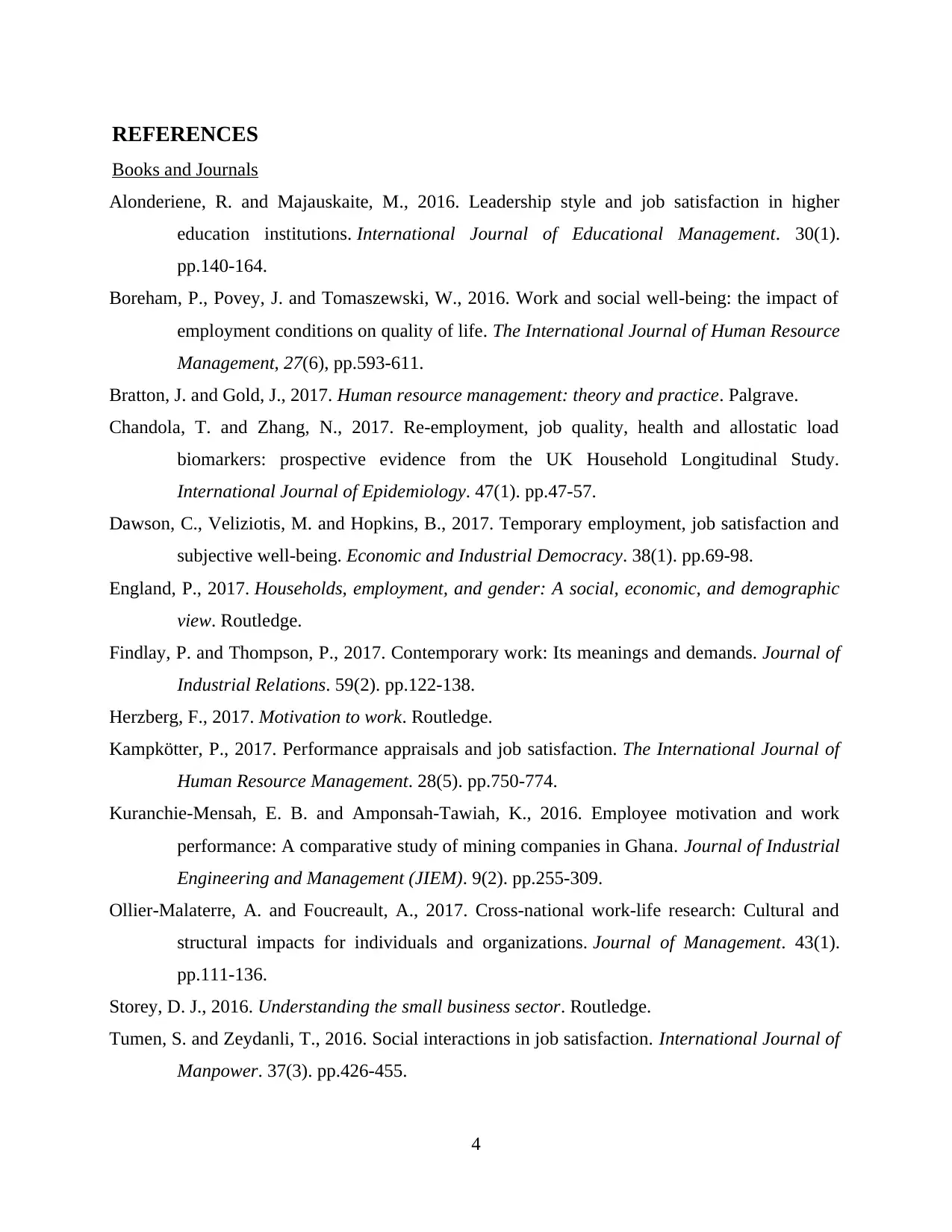
REFERENCES
Books and Journals
Alonderiene, R. and Majauskaite, M., 2016. Leadership style and job satisfaction in higher
education institutions. International Journal of Educational Management. 30(1).
pp.140-164.
Boreham, P., Povey, J. and Tomaszewski, W., 2016. Work and social well-being: the impact of
employment conditions on quality of life. The International Journal of Human Resource
Management, 27(6), pp.593-611.
Bratton, J. and Gold, J., 2017. Human resource management: theory and practice. Palgrave.
Chandola, T. and Zhang, N., 2017. Re-employment, job quality, health and allostatic load
biomarkers: prospective evidence from the UK Household Longitudinal Study.
International Journal of Epidemiology. 47(1). pp.47-57.
Dawson, C., Veliziotis, M. and Hopkins, B., 2017. Temporary employment, job satisfaction and
subjective well-being. Economic and Industrial Democracy. 38(1). pp.69-98.
England, P., 2017. Households, employment, and gender: A social, economic, and demographic
view. Routledge.
Findlay, P. and Thompson, P., 2017. Contemporary work: Its meanings and demands. Journal of
Industrial Relations. 59(2). pp.122-138.
Herzberg, F., 2017. Motivation to work. Routledge.
Kampkötter, P., 2017. Performance appraisals and job satisfaction. The International Journal of
Human Resource Management. 28(5). pp.750-774.
Kuranchie-Mensah, E. B. and Amponsah-Tawiah, K., 2016. Employee motivation and work
performance: A comparative study of mining companies in Ghana. Journal of Industrial
Engineering and Management (JIEM). 9(2). pp.255-309.
Ollier-Malaterre, A. and Foucreault, A., 2017. Cross-national work-life research: Cultural and
structural impacts for individuals and organizations. Journal of Management. 43(1).
pp.111-136.
Storey, D. J., 2016. Understanding the small business sector. Routledge.
Tumen, S. and Zeydanli, T., 2016. Social interactions in job satisfaction. International Journal of
Manpower. 37(3). pp.426-455.
4
Books and Journals
Alonderiene, R. and Majauskaite, M., 2016. Leadership style and job satisfaction in higher
education institutions. International Journal of Educational Management. 30(1).
pp.140-164.
Boreham, P., Povey, J. and Tomaszewski, W., 2016. Work and social well-being: the impact of
employment conditions on quality of life. The International Journal of Human Resource
Management, 27(6), pp.593-611.
Bratton, J. and Gold, J., 2017. Human resource management: theory and practice. Palgrave.
Chandola, T. and Zhang, N., 2017. Re-employment, job quality, health and allostatic load
biomarkers: prospective evidence from the UK Household Longitudinal Study.
International Journal of Epidemiology. 47(1). pp.47-57.
Dawson, C., Veliziotis, M. and Hopkins, B., 2017. Temporary employment, job satisfaction and
subjective well-being. Economic and Industrial Democracy. 38(1). pp.69-98.
England, P., 2017. Households, employment, and gender: A social, economic, and demographic
view. Routledge.
Findlay, P. and Thompson, P., 2017. Contemporary work: Its meanings and demands. Journal of
Industrial Relations. 59(2). pp.122-138.
Herzberg, F., 2017. Motivation to work. Routledge.
Kampkötter, P., 2017. Performance appraisals and job satisfaction. The International Journal of
Human Resource Management. 28(5). pp.750-774.
Kuranchie-Mensah, E. B. and Amponsah-Tawiah, K., 2016. Employee motivation and work
performance: A comparative study of mining companies in Ghana. Journal of Industrial
Engineering and Management (JIEM). 9(2). pp.255-309.
Ollier-Malaterre, A. and Foucreault, A., 2017. Cross-national work-life research: Cultural and
structural impacts for individuals and organizations. Journal of Management. 43(1).
pp.111-136.
Storey, D. J., 2016. Understanding the small business sector. Routledge.
Tumen, S. and Zeydanli, T., 2016. Social interactions in job satisfaction. International Journal of
Manpower. 37(3). pp.426-455.
4
Paraphrase This Document
Need a fresh take? Get an instant paraphrase of this document with our AI Paraphraser

Wheatley, D., 2017. Autonomy in paid work and employee subjective well-being. Work and
Occupations. 44(3). pp.296-328.
Yousef, D. A., 2017. Organizational commitment, job satisfaction and attitudes toward
organizational change: A study in the local government. International Journal of Public
Administration. 40(1). pp.77-88.
5
Occupations. 44(3). pp.296-328.
Yousef, D. A., 2017. Organizational commitment, job satisfaction and attitudes toward
organizational change: A study in the local government. International Journal of Public
Administration. 40(1). pp.77-88.
5
1 out of 8
Related Documents
Your All-in-One AI-Powered Toolkit for Academic Success.
+13062052269
info@desklib.com
Available 24*7 on WhatsApp / Email
![[object Object]](/_next/static/media/star-bottom.7253800d.svg)
Unlock your academic potential
Copyright © 2020–2025 A2Z Services. All Rights Reserved. Developed and managed by ZUCOL.





